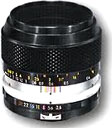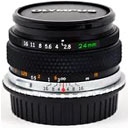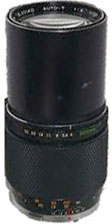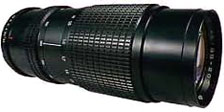Your eyes are extremely good optical tools. Years and years of
evolution allow us to view a large forest in panorama, focus in on a
deer breaking cover, then aim a projectile at the prey and bring it
home for dinner. Excellent color vision allows us to tell the
difference between red berries and burgundy berries so we can
discriminate between the berries that are good food and the berries
that are poison. We can see in the dark and in extremely bright light.
We also have the ability to focus our eyes on very close objects.
(Unfortunately, my close-up vision is compromised by my age.)
In a nutshell, a single camera lens cannot equal your eye.
However, just you can extend the range of your vision by the use of
microscopes and telescopes, you can extend the range of your camera if
your camera has interchangeable lenses.
Camera manufacturers make compromises, just like computer
manufacturers. The percentage of folks who want to attach extreme
optical devices to cameras is limited. Most folks use a camera to
capture a slice of time, to remember a particular event. As technology
advances, camera manufacturers can pack more and more features into
"point and shoot" cameras designed for this market.
It has reached the point where you can honestly say that the latest
digital camera that you purchased for a modest price can surpass that
old Nikon F (the
first Japanese camera embraced by professional photographers) or
Canon A-1 (the
first SLR to offer programmed, shutter-preferred, aperture preferred,
and manual exposure options, as well as a dedicated intelligent
flash).
Except for one thing: The lens on that camera will not come off.
Even if you have a "super zoom" lens with a macro feature, it still
will not come off the camera. There was (at one time) a universe of
different lenses available for that old Nikon or Canon (or Pentax,
Minolta, Miranda, Contax, Olympus, Leica, or Ricoh, to mention only a
few). as well as adapters for telescopes and microscopes.
I feel the need for that sort of stuff. Most folks don't.
Lens Basics
This information is specific to full-frame 35mm SLR cameras. Most
digital SLRs have a smaller-than-full-frame sensor so a lens works like
one 50-60% longer on a full-frame camera. For 4/3 system cameras, which
have even smaller sensors, they work like a lens twice as long.

55mm f/3.5 Micro Nikkor
Normal: I have a problem with what a normal lens
means.1 On a 35mm SLR, it's usually 50mm and often transmits
more light than any other lens (f/1.4 to f/1.8 is typical).2
It's supposed to give an approximation of your vision, but as I
mentioned before, your eyes can give you everything from a super
wide-angle view to a telephoto view. I remember my compatriots and I at
photo school using wide-angle lenses as our standard lens because of
the exaggerated perspective. I do use standard lens to shoot portraits,
and I have a macro lens (one designed for extreme close-ups) at the
standard lens focal length.

24mm f/2.8 Zuiko lens
Wide-angle: This is a lens with a wider angle of view than a
normal lens. On a 35mm camera, any a 35mm or shorter lens is
wide-angle. When you are trying to take that picture at Thanksgiving
with all 12 of your nearest and dearest at the table, you need a
wide-angle lens. The same thing goes the Grand Canyon or any
architecture, interior or exterior.

200mm f/4 Zuiko lens
Telephoto: Just like a telescope, a telephoto lens has a
narrow angle of view and is used to magnify faraway objects, making
them appear to be closer. On 35mm cameras, telephoto lenses start at
85mm. If you like to photograph sports action or wildlife, this is the
lens for you. A number of portrait photographers use a mild telephoto
lens to give a more flattering perspective of their subjects as well as
some separation from the background.

Old zoom lens for a 35mm SLR.
Zoom: If you like zoom lenses, it's time to leave the room. I
admit that my opinions on this matter are purely my own, and many
people use zoom lenses without mishap. I'm just an old curmudgeon who
thinks that fixed focal lengths are sharper than zoom
lenses.3 They tend to be cheaper and, of course, more
convenient to me. But experts tell me that new, modern zoom lenses are
just as sharp, easier to use, and will cure cancer in laboratory rats.
I just don't care. I'd rather have two fixed focal length lenses (at
opposite ends of a zoom lens range) than a zoom lens. Call me crazy,
but zoom lenses are bigger and bulkier with higher f-stops, more lens
elements, and a total disregard for those of us old timers who can
frame a picture without having to zoom every which way.
I know I'm on there losing side of this argument, but someone has to
be. 
Publisher's Notes






